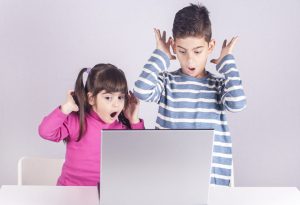Positive Effects of Social Media on Children
While social media is mostly talked about in a negative light, there are some strong positive arguments in favour of it. Here are the advantages of social media for kids:
- Spending time online is important for the younger generation to pick up necessary technical skills they will need to navigate their way through the future. It allows them to be competent citizens in a digital age, where they can fully participate in the broader society and learn the social skills of that generation. They will also learn to adapt to having an elaborate online network of friends and acquaintances.
- Social media is being used by the youth in positive ways that weren’t thought of before. It is not just a medium for socialising, but kids and adolescents have found a new way to express themselves creatively, and interact and learn with a broader audience. Students are using it to form study groups, where they can easily and instantaneously share ideas and learning material.
- Social networking has also changed the way kids learn. It has introduced a more peer-based learning method, where students are motivated to learn from their peers. They are always interacting and giving feedback to one another, which refines their learning process. They are also more enthusiastic to learn from each other, than from adults. Learning can now come from newer sources and not just their parents or teachers.
- Not only is social media a tool to communicate, but it is also an important part of the lives of adolescents and young adults. It gives them an avenue to stay connected with their peers from sports teams, activity clubs, and classes, while also allowing them to network with others having similar interests.
- It has been observed that social media makes people more empathetic, considerate, and relationship-oriented. They express how they feel, by commenting or liking pictures, videos or status updates posted by their friends. They also wish more people than ever, on their birthdays.
- Kids maintain long-term friendships with others by staying in touch with them online, even when they can no longer meet each other in person.
- It has been observed that virtual empathy shown by youngsters is received positively by their distressed friends on social media.Social media improves their moods and helps them find solutions to problems. Virtual empathy can also spill over to the real world, and teach youngsters how to be more compassionate.
- Social media offers a platform for youngsters to connect with others who share similar interests. It can be anything relating to hobbies or professions involving music, art, games, and blogs.
- Kids also get to have an influence on their community through social networking groups, and help bring about positive changes. Some of the examples being fundraising campaigns and participating in political events and debates.
- Social media allows youngsters to network with people from around the globe, exposing them to cultures and ideas that they may not otherwise come across. It helps them acquire a broader perspective on life and people in general.
- Social media gives introverted kids the chance to open up over the internet, giving them a boost of confidence. Many youngsters find it easier to talk to people in person, after interacting with them over social media platforms. It also helps them interact with people around the world, understanding other cultures, food, music, and more.
- Many youngsters like stay on top of current events, and with several news accounts to follow on social media, it has become a powerful tool in feeding concise and relevant news to kids. This helps them expand general knowledge, keeping them in touch with latest happenings around the world.

Negative Effect of Social Media on Kids
A popular opinion of the impact of social media on children is that it does more harm than good. Here are some negative impacts of social media on children:
- The most well-known downside of social media is the addiction it creates. Constantly checking the news feed of the different social media sites becomes an addictive habit. Experts think that some features such as ‘likes’ and ‘shares’ activate the reward centre in the brain. This reward circuitry is highly sensitive during adolescence and may partly explain why teenagers are more into social media than adults. These features further influence our moods. Being social creatures, we value interaction and connection, both of which determine how we think of ourselves. This drives a lot of our behaviour on a day-to-day basis, which is centred around social media.
- Youngsters addicted to social media end up spending hours, each day, watching videos, photos, and other content posted in the accounts they follow. This addiction disrupts other activities, such as school work, sports, study, and other productive routines. They end up wasting a substantial amount of time, every day, resulting in poor grades in school. Some heavy users of social media admit to checking their feeds as many as 100 times a day, and sometimes, during school hours too. Some of the kids also realise that they are wasting a lot of time on social media, which affects their mood negatively. It also builds in them a defeatist attitude.
- Psychologists have long observed bad effects of social media on the mental health of children. One finding suggests that children spending more than three hours a day on social media are twice as likely to suffer from poor mental health. Their immersion in a virtual world delays their emotional and social development. The effects on teens is much stronger. One report by the IZA Institute of Labour Economics suggests that spending only an hour a day on social media can make a teen miserable. It could be due to the influence of social comparisons, cyber bullying, and decreased person to person interactions.
- Using Facebook is also known to lead to a decline in the subjective well-being of youngsters. The more they use Facebook, the more they feel dissatisfied with their lives, in general. Teens are also observed to be suffering from “Facebook depression” after spending too much time on it or other social networking sites. Some also become anxious and moody, as they see that the lives of their friends are better than their’s, even though they may know that their representation is idealised. However, vulnerable teens are more prone to this than their confident counterparts.
- Screen relationships also detract real-life relationships and social skills in children and teenagers. This happens because they grow up without learning how to read non-verbal cues and facial gestures of people. Social interaction is critical to developing the skills needed to understand other people’s moods and emotions. Hence, children growing up interacting mostly with social media may turn out non-empathetic and also become poor at communicating verbally and non-verbally.
- While some teenagers get affected by the pressure of having to react to posts of their friends or respond to messages, others fear not being in the social loop, which is called FOMO (fear of missing out). Teens obsessively check their media feeds for updates by friends, as they don’t want to miss out on jokes, activities, parties and gossip. FOMO is also known to lead to depression and anxiety, while being a major contributor to teenagers’ heavy use of social media.
- Obsession with the self and posting endless updates and selfies on social media is increases narcissism in youngsters. Their moods depend heavily on how appreciated their photos are on social media and they go into anxiety when they don’t get the attention they expect. Having their own pages makes kids more self-centred. Some vulnerable children would then live under the notion that everything revolves around them. This is a precursor to dysfunctional emotional conditions, later in their life, and a lack of empathy for others.
- Selfies turned into the most popular thing with the advent of camera phones. Taking selfies every hour and posting it on social media is strongly linked to narcissism, and can trigger obsessions with one’s looks. Some selfie addicts have been known to do dangerous things, such as scale skyscrapers, pose with wild animals or weapons, or stand close to moving vehicles, such as trains to get a “cool” selfie, which has ended fatally. Risky behaviour is also observed in teens, as they participate in mass social media challenges that involve engaging in absurd or dangerous activities while filming themselves.
- Facebook and other social media platforms have had a negative effect on the brains of youngsters. It sets their brains to a state similar to a child that gets attracted to bright colours and buzzing noises, while having a short attention span. It is no surprise this happens, as it barely takes any concentration or thought process to browse on social networking sites.
- It is often the case with social media effects on child development that with having grown on superficial stimuli, children lack the ability to engage deeply with others and themselves. They end up living for perfect Instagram photos, while missing out on the actual experience of the event, which may be a vacation or having lunch with friends or family.
- Other dangers of social networking sites for children include cyber crime and cyber bullying. Bullying is easier on social media platforms, in the form of threatening messages or subtle posts with offensive content directed at a particular person. Younger children can also become targets of stalking by predatory individuals who intend to cause harm.
- Offensive, explicit and violent content is easily accessible on the internet, which impacts young minds. This content can shape their minds in the wrong manner, or cause them to become mentally distrubed, later affecting other avenues of their lives, from education to personal relationships, and more.



You must be logged in to post a comment.